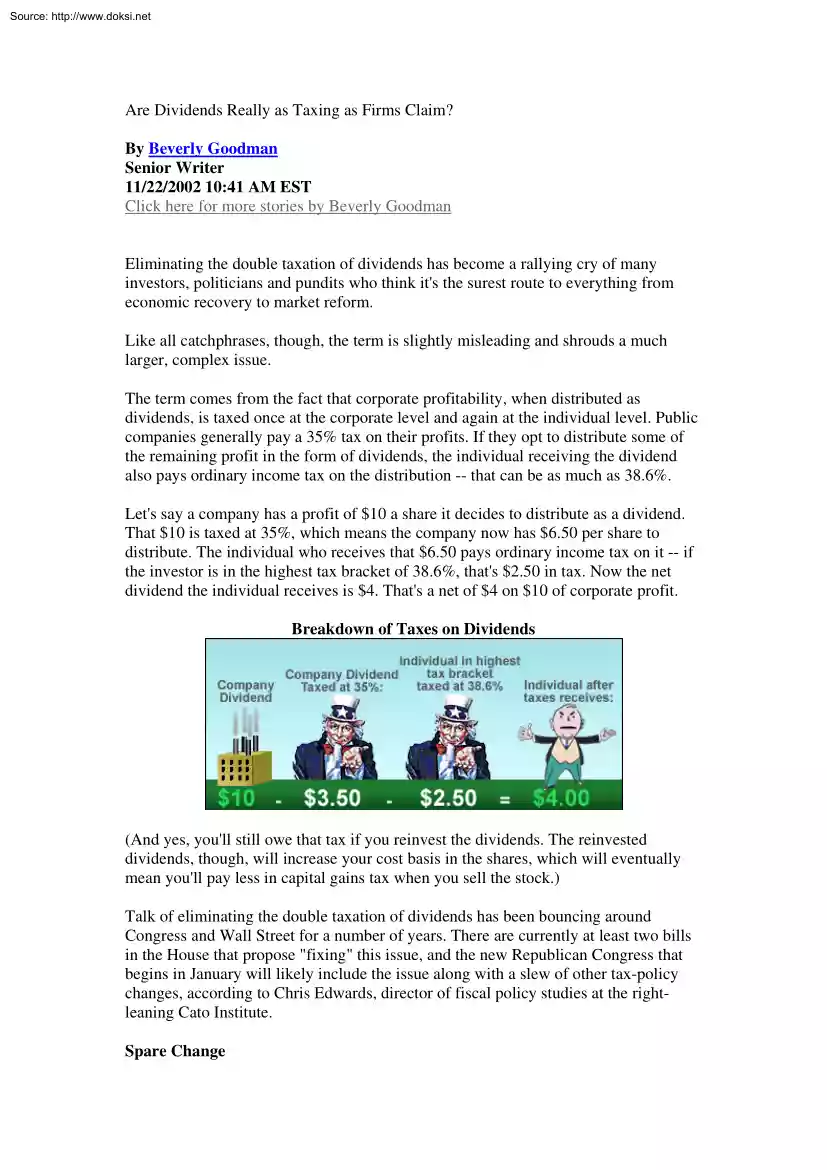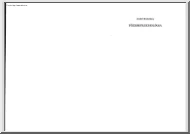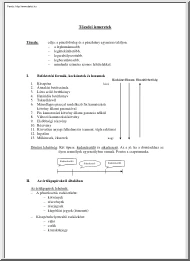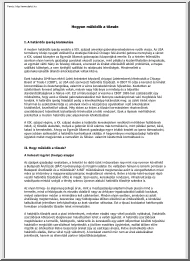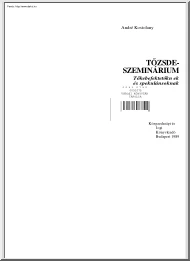Datasheet
Year, pagecount:2002, 4 page(s)
Language:English
Downloads:3
Uploaded:June 08, 2020
Size:487 KB
Institution:
-
Comments:
Attachment:-
Download in PDF:Please log in!
Comments
No comments yet. You can be the first!Most popular documents in this category
Content extract
Source: http://www.doksinet Are Dividends Really as Taxing as Firms Claim? By Beverly Goodman Senior Writer 11/22/2002 10:41 AM EST Click here for more stories by Beverly Goodman Eliminating the double taxation of dividends has become a rallying cry of many investors, politicians and pundits who think its the surest route to everything from economic recovery to market reform. Like all catchphrases, though, the term is slightly misleading and shrouds a much larger, complex issue. The term comes from the fact that corporate profitability, when distributed as dividends, is taxed once at the corporate level and again at the individual level. Public companies generally pay a 35% tax on their profits. If they opt to distribute some of the remaining profit in the form of dividends, the individual receiving the dividend also pays ordinary income tax on the distribution -- that can be as much as 38.6% Lets say a company has a profit of $10 a share it decides to distribute as a dividend. That
$10 is taxed at 35%, which means the company now has $6.50 per share to distribute. The individual who receives that $650 pays ordinary income tax on it -- if the investor is in the highest tax bracket of 38.6%, thats $250 in tax Now the net dividend the individual receives is $4. Thats a net of $4 on $10 of corporate profit Breakdown of Taxes on Dividends (And yes, youll still owe that tax if you reinvest the dividends. The reinvested dividends, though, will increase your cost basis in the shares, which will eventually mean youll pay less in capital gains tax when you sell the stock.) Talk of eliminating the double taxation of dividends has been bouncing around Congress and Wall Street for a number of years. There are currently at least two bills in the House that propose "fixing" this issue, and the new Republican Congress that begins in January will likely include the issue along with a slew of other tax-policy changes, according to Chris Edwards, director of fiscal
policy studies at the rightleaning Cato Institute. Spare Change Source: http://www.doksinet Clearly, wealthy investors (those in high tax brackets and with a big investments in dividend-paying stocks) are hit the hardest most immediately. Even so, about half the dividends distributed escape immediate taxation, according to William Gale, a senior fellow at the Brookings Institution. Dividend-paying stocks held in pension funds and other tax-deferred plans such as 401(k)s and IRAs are not taxed when theyre paid out. Rather, the dividends (just like all the other money in those plans) are taxed when the individual withdraws money from the plan. But proponents of change argue that eliminating the double taxation will not only encourage companies to pay out more profits to investors, but that it also heralds a host of beneficial ramifications, including better behavior among executives and a more stable stock market. "Theres been a standard economic argument that the recent
corporate scandals were pushed to the edge because the tax code encourages companies to be over-leveraged," Edwards says. "Eliminating the double taxation of dividends would encourage companies to finance themselves with equity rather than debt. Theyd have no incentive to retain earnings, which sometimes means management has too much money to play with." Instead of paying out dividends, many cash-rich companies -- such as the two most oft-cited examples of Cisco Systems (CSCO:Nasdaq - news - commentary - research - analysis) and Microsoft (MSFT:Nasdaq - news - commentary - research - analysis) - hang on to their earnings. Taxes certainly play a role in that decision, but other reasons also include wanting to keep a "war chest" to finance impending acquisitions or other costly endeavors; opting to buy back company stock, which benefits shareholders; and the sense that the company will get a much higher return on the profits than individual shareholders will.
"Most companies retain their earnings for strategic reasons and business considerations," says Michael Levin, a corporate tax analyst for RIA, publisher of tax and accounting information. "Changing the law wont mean theyll all start paying dividends." Many growth companies, in the technology sector in particular, are unlikely to ever pay out dividends, because almost by definition companies that pay dividends are not growing as fast as they once did. "Giving out dividends a company is saying that were betting that mom and pop investor can find a better economic use for this money than we can," says James Cusser, who manages a $1.5 billion bond portfolio for Waddell & Reed "Its a game of perception." Indeed, this week Cisco shareholders voted against a proposal to distribute at least part of the companys $21.5 billion in cash CEO John Chambers has repeatedly said the company prefers to spend its cash on acquisitions and stock buybacks. In what
may have been a not-so-subtle message to Washington, though, Chambers Source: http://www.doksinet acknowledged at the shareholders meeting that "if dividends were certain not to be double taxed, we would look at it." For the Good of the Country The stomach-churning performance of growth stocks is exactly why they should start paying dividends, Cusser says. "Much of the volatility in the market is because too many companies dont pay dividends," he says. "Dividends stabilize volatility Its just like bonds -- if you have a zero-coupon bond, all your rate of return comes from the price variation of the bond. Its the most volatile of all bonds" (Zero-coupon bonds are sold at a deep discount to face value, and mature at face value. Such bonds tend to be very sensitive to changes in interest rates, since there are no coupon payments to reduce the impact of interest rates changes.) Cusser points to the 11 1/4 U.S Treasuries, which have a face value of $100 but
are currently trading at $165 since the market has placed such a high premium on Treasuries. Bonds that pay a coupon, though, generally dont trade at such a high premium or discount to face value, because investors are placated by the regular coupon (interest) payments. The theory bears out in the equity market as well. The 149 companies in the S&P 500 that do not pay a dividend saw their share prices plummet an average of 32.7% yearto-date as of Oct 31 The 351 companies that do pay a dividend had an average drop in share price of just 12.6% (There are other factors to consider, of course, but the difference is telling.) Possible Solutions There are two principal ways of eliminating this double taxation -- give the corporations a break or give the individuals a break. The most popular corporate tax break proposed is to simply exempt from tax any profit that gets distributed to shareholders. A solution that gives companies an immediate tax break on the assumption that subsequent
effects will benefit the individual, though, isnt politically viable on its own. The core of any proposal will likely focus on the individual. The two options being floated in Congress now both allow for individual investor to exclude a portion of their dividends from tax. One way of accomplishing that is through a complicated calculation that would give individuals a tax credit based on the tax the corporation pays. Such a calculation is scalable, and would get larger in proportion to the size of the investment. "The credit idea will die a quick death," predicts Martin Nissenbaum, the national director of income tax planning for Ernst & Young. "People wont understand how it works." Source: http://www.doksinet Alternatively, Congress can implement a more straightforward exemption; for instance, simply excluding the first $1,500 in dividends from tax. "The Internal Revenue Service just changed the rules for how dividends get reported," Nissenbaum
says. "You dont need to fill out the Schedule B if you have $1,500 or less in dividends. That would be a good cutoff for the exemption" All these possible solutions, though, will ultimately be evaluated based on how much theyll cost. As Congress debates a host of tax-policy changes -- including everything from expanding the benefits of retirement plans to eliminating the estate tax -- the benefits and cost of eliminating the double taxation of dividends must be weighed against each of the other tax policy proposals
$10 is taxed at 35%, which means the company now has $6.50 per share to distribute. The individual who receives that $650 pays ordinary income tax on it -- if the investor is in the highest tax bracket of 38.6%, thats $250 in tax Now the net dividend the individual receives is $4. Thats a net of $4 on $10 of corporate profit Breakdown of Taxes on Dividends (And yes, youll still owe that tax if you reinvest the dividends. The reinvested dividends, though, will increase your cost basis in the shares, which will eventually mean youll pay less in capital gains tax when you sell the stock.) Talk of eliminating the double taxation of dividends has been bouncing around Congress and Wall Street for a number of years. There are currently at least two bills in the House that propose "fixing" this issue, and the new Republican Congress that begins in January will likely include the issue along with a slew of other tax-policy changes, according to Chris Edwards, director of fiscal
policy studies at the rightleaning Cato Institute. Spare Change Source: http://www.doksinet Clearly, wealthy investors (those in high tax brackets and with a big investments in dividend-paying stocks) are hit the hardest most immediately. Even so, about half the dividends distributed escape immediate taxation, according to William Gale, a senior fellow at the Brookings Institution. Dividend-paying stocks held in pension funds and other tax-deferred plans such as 401(k)s and IRAs are not taxed when theyre paid out. Rather, the dividends (just like all the other money in those plans) are taxed when the individual withdraws money from the plan. But proponents of change argue that eliminating the double taxation will not only encourage companies to pay out more profits to investors, but that it also heralds a host of beneficial ramifications, including better behavior among executives and a more stable stock market. "Theres been a standard economic argument that the recent
corporate scandals were pushed to the edge because the tax code encourages companies to be over-leveraged," Edwards says. "Eliminating the double taxation of dividends would encourage companies to finance themselves with equity rather than debt. Theyd have no incentive to retain earnings, which sometimes means management has too much money to play with." Instead of paying out dividends, many cash-rich companies -- such as the two most oft-cited examples of Cisco Systems (CSCO:Nasdaq - news - commentary - research - analysis) and Microsoft (MSFT:Nasdaq - news - commentary - research - analysis) - hang on to their earnings. Taxes certainly play a role in that decision, but other reasons also include wanting to keep a "war chest" to finance impending acquisitions or other costly endeavors; opting to buy back company stock, which benefits shareholders; and the sense that the company will get a much higher return on the profits than individual shareholders will.
"Most companies retain their earnings for strategic reasons and business considerations," says Michael Levin, a corporate tax analyst for RIA, publisher of tax and accounting information. "Changing the law wont mean theyll all start paying dividends." Many growth companies, in the technology sector in particular, are unlikely to ever pay out dividends, because almost by definition companies that pay dividends are not growing as fast as they once did. "Giving out dividends a company is saying that were betting that mom and pop investor can find a better economic use for this money than we can," says James Cusser, who manages a $1.5 billion bond portfolio for Waddell & Reed "Its a game of perception." Indeed, this week Cisco shareholders voted against a proposal to distribute at least part of the companys $21.5 billion in cash CEO John Chambers has repeatedly said the company prefers to spend its cash on acquisitions and stock buybacks. In what
may have been a not-so-subtle message to Washington, though, Chambers Source: http://www.doksinet acknowledged at the shareholders meeting that "if dividends were certain not to be double taxed, we would look at it." For the Good of the Country The stomach-churning performance of growth stocks is exactly why they should start paying dividends, Cusser says. "Much of the volatility in the market is because too many companies dont pay dividends," he says. "Dividends stabilize volatility Its just like bonds -- if you have a zero-coupon bond, all your rate of return comes from the price variation of the bond. Its the most volatile of all bonds" (Zero-coupon bonds are sold at a deep discount to face value, and mature at face value. Such bonds tend to be very sensitive to changes in interest rates, since there are no coupon payments to reduce the impact of interest rates changes.) Cusser points to the 11 1/4 U.S Treasuries, which have a face value of $100 but
are currently trading at $165 since the market has placed such a high premium on Treasuries. Bonds that pay a coupon, though, generally dont trade at such a high premium or discount to face value, because investors are placated by the regular coupon (interest) payments. The theory bears out in the equity market as well. The 149 companies in the S&P 500 that do not pay a dividend saw their share prices plummet an average of 32.7% yearto-date as of Oct 31 The 351 companies that do pay a dividend had an average drop in share price of just 12.6% (There are other factors to consider, of course, but the difference is telling.) Possible Solutions There are two principal ways of eliminating this double taxation -- give the corporations a break or give the individuals a break. The most popular corporate tax break proposed is to simply exempt from tax any profit that gets distributed to shareholders. A solution that gives companies an immediate tax break on the assumption that subsequent
effects will benefit the individual, though, isnt politically viable on its own. The core of any proposal will likely focus on the individual. The two options being floated in Congress now both allow for individual investor to exclude a portion of their dividends from tax. One way of accomplishing that is through a complicated calculation that would give individuals a tax credit based on the tax the corporation pays. Such a calculation is scalable, and would get larger in proportion to the size of the investment. "The credit idea will die a quick death," predicts Martin Nissenbaum, the national director of income tax planning for Ernst & Young. "People wont understand how it works." Source: http://www.doksinet Alternatively, Congress can implement a more straightforward exemption; for instance, simply excluding the first $1,500 in dividends from tax. "The Internal Revenue Service just changed the rules for how dividends get reported," Nissenbaum
says. "You dont need to fill out the Schedule B if you have $1,500 or less in dividends. That would be a good cutoff for the exemption" All these possible solutions, though, will ultimately be evaluated based on how much theyll cost. As Congress debates a host of tax-policy changes -- including everything from expanding the benefits of retirement plans to eliminating the estate tax -- the benefits and cost of eliminating the double taxation of dividends must be weighed against each of the other tax policy proposals
